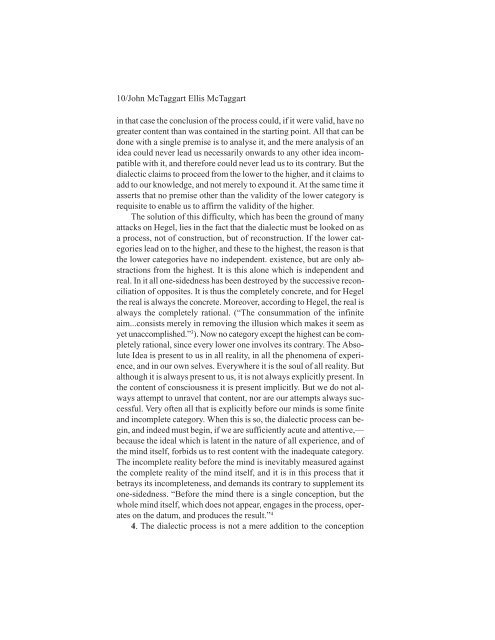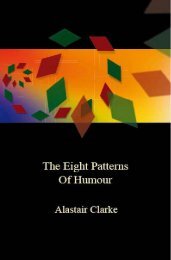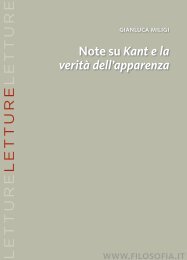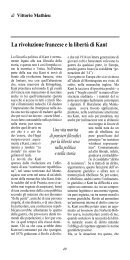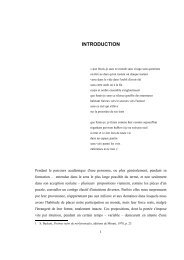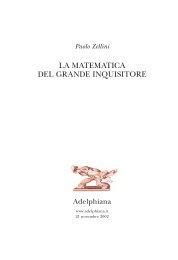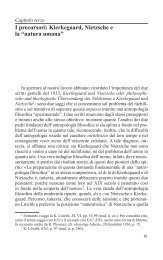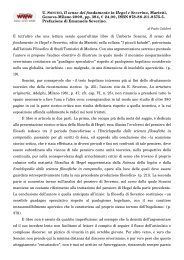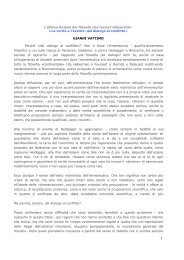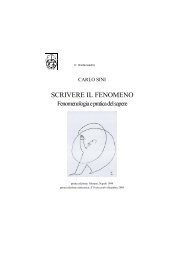McTaggart, Studies in the Hegelian Dialectic
McTaggart, Studies in the Hegelian Dialectic
McTaggart, Studies in the Hegelian Dialectic
You also want an ePaper? Increase the reach of your titles
YUMPU automatically turns print PDFs into web optimized ePapers that Google loves.
10/John <strong>McTaggart</strong> Ellis <strong>McTaggart</strong><br />
<strong>in</strong> that case <strong>the</strong> conclusion of <strong>the</strong> process could, if it were valid, have no<br />
greater content than was conta<strong>in</strong>ed <strong>in</strong> <strong>the</strong> start<strong>in</strong>g po<strong>in</strong>t. All that can be<br />
done with a s<strong>in</strong>gle premise is to analyse it, and <strong>the</strong> mere analysis of an<br />
idea could never lead us necessarily onwards to any o<strong>the</strong>r idea <strong>in</strong>compatible<br />
with it, and <strong>the</strong>refore could never lead us to its contrary. But <strong>the</strong><br />
dialectic claims to proceed from <strong>the</strong> lower to <strong>the</strong> higher, and it claims to<br />
add to our knowledge, and not merely to expound it. At <strong>the</strong> same time it<br />
asserts that no premise o<strong>the</strong>r than <strong>the</strong> validity of <strong>the</strong> lower category is<br />
requisite to enable us to affirm <strong>the</strong> validity of <strong>the</strong> higher.<br />
The solution of this difficulty, which has been <strong>the</strong> ground of many<br />
attacks on Hegel, lies <strong>in</strong> <strong>the</strong> fact that <strong>the</strong> dialectic must be looked on as<br />
a process, not of construction, but of reconstruction. If <strong>the</strong> lower categories<br />
lead on to <strong>the</strong> higher, and <strong>the</strong>se to <strong>the</strong> highest, <strong>the</strong> reason is that<br />
<strong>the</strong> lower categories have no <strong>in</strong>dependent. existence, but are only abstractions<br />
from <strong>the</strong> highest. It is this alone which is <strong>in</strong>dependent and<br />
real. In it all one-sidedness has been destroyed by <strong>the</strong> successive reconciliation<br />
of opposites. It is thus <strong>the</strong> completely concrete, and for Hegel<br />
<strong>the</strong> real is always <strong>the</strong> concrete. Moreover, accord<strong>in</strong>g to Hegel, <strong>the</strong> real is<br />
always <strong>the</strong> completely rational. (“The consummation of <strong>the</strong> <strong>in</strong>f<strong>in</strong>ite<br />
aim...consists merely <strong>in</strong> remov<strong>in</strong>g <strong>the</strong> illusion which makes it seem as<br />
yet unaccomplished.” 3 ). Now no category except <strong>the</strong> highest can be completely<br />
rational, s<strong>in</strong>ce every lower one <strong>in</strong>volves its contrary. The Absolute<br />
Idea is present to us <strong>in</strong> all reality, <strong>in</strong> all <strong>the</strong> phenomena of experience,<br />
and <strong>in</strong> our own selves. Everywhere it is <strong>the</strong> soul of all reality. But<br />
although it is always present to us, it is not always explicitly present. In<br />
<strong>the</strong> content of consciousness it is present implicitly. But we do not always<br />
attempt to unravel that content, nor are our attempts always successful.<br />
Very often all that is explicitly before our m<strong>in</strong>ds is some f<strong>in</strong>ite<br />
and <strong>in</strong>complete category. When this is so, <strong>the</strong> dialectic process can beg<strong>in</strong>,<br />
and <strong>in</strong>deed must beg<strong>in</strong>, if we are sufficiently acute and attentive,—<br />
because <strong>the</strong> ideal which is latent <strong>in</strong> <strong>the</strong> nature of all experience, and of<br />
<strong>the</strong> m<strong>in</strong>d itself, forbids us to rest content with <strong>the</strong> <strong>in</strong>adequate category.<br />
The <strong>in</strong>complete reality before <strong>the</strong> m<strong>in</strong>d is <strong>in</strong>evitably measured aga<strong>in</strong>st<br />
<strong>the</strong> complete reality of <strong>the</strong> m<strong>in</strong>d itself, and it is <strong>in</strong> this process that it<br />
betrays its <strong>in</strong>completeness, and demands its contrary to supplement its<br />
one-sidedness. “Before <strong>the</strong> m<strong>in</strong>d <strong>the</strong>re is a s<strong>in</strong>gle conception, but <strong>the</strong><br />
whole m<strong>in</strong>d itself, which does not appear, engages <strong>in</strong> <strong>the</strong> process, operates<br />
on <strong>the</strong> datum, and produces <strong>the</strong> result.” 4<br />
4. The dialectic process is not a mere addition to <strong>the</strong> conception


